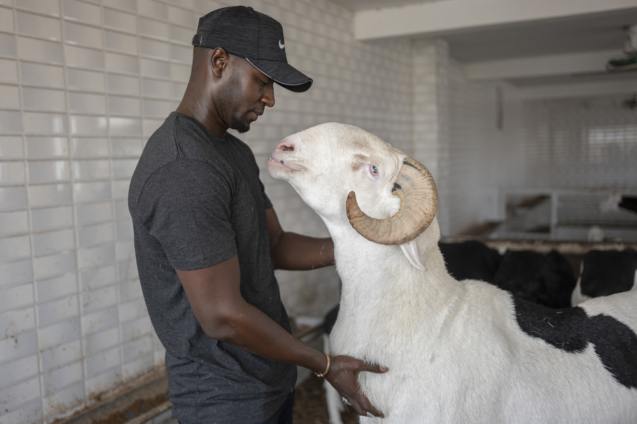When Cheikh Moustapha Seck, a 24-year-old sheep breeder from Senegal, speaks about his animals, his face lights up.
“You need love and patience to work with the sheep,” said Seck, affectionately stroking the long neck of Sonko, his champion sheep, named after the country’s new prime minister.
Sonko is no ordinary sheep. It is a locally bred Ladoum, the equivalent of a Ferrari among the woolly creatures. The majestic-looking Ladoum can weigh up to 397 pounds (180 kilograms), and it has made this coastal West African nation famous among breeders.
As Muslims worldwide prepare to celebrate Eid al-Adha this weekend, the second most important holiday in the Islamic calendar, the Ladoum get their moment to shine.
During Tabaski, as the holiday is locally known, Muslims commemorate the Quranic tale of Ibrahim’s willingness to sacrifice Ismail as an act of obedience to God. They kill and eat a sheep, making the animal extremely sought after in the days before the holiday.
Sonko the sheep was born last year, when its namesake Ousmane Sonko was still an imprisoned opposition leader and seemingly far from leading the country. Just like him, Sonko the sheep “was a warrior and our hope,” Seck said.

As political events have calmed since Senegal’s election earlier this year, this weekend’s celebrations have new life. People have turned their attention from protests to pampering — the prize sheep, at least.
Celebrated for their gleaming white fur and symmetrical horns, the Ladoum is most often bought for prestige breeding and beauty contests, and not to be eaten. On Eid al-Adha, like Ibrahim’s son, they will be spared.
Very few in Senegal can afford a Ladoum. Worth up to $70,000, the sheep is the ultimate symbol of social prestige in a country where the GDP per capita does not exceed $1,600. After years of record inflation, many struggle to afford regular sheep at prices starting from around $280.
The Ladoum spend their days being groomed, massaged and fed syringes of vitamins in special parlors, decorated with photos of champion sheep and their lineage.
Balla Gadiaga, a parlor owner who inherited the passion for sheep from his parents, said his clients come from all over the African continent.
“Just yesterday, I had someone from Abuja on the phone,” he said, referring to Nigeria’s capital. “We sell to clients in Senegal but also in Gambia, Nigeria, Mali. Everywhere.”
His favorite sheep is named BRT after the acronym for electric buses driving around Dakar, the capital. It is of “excellent measurements” and “extraordinary beauty,” he said. It is also worth $40,000, a deal compared to Gadiaga’s most expensive at over $65,000.
Gadiaga said the sheep are not only great business but also a source of happiness.
“When you are stressed out and you go in front of the sheep, you are cool,” he said. “You feel at ease.”
Latest Stories
-
IFRS 17 is one of biggest changes to financial reporting standards in insurance industry – Deloitte
1 min -
Enimil Ashon: Whose polls do you believe: ‘Global Info or Prof Sarpong?
4 mins -
Ghana Climate Innovation Centre welcomes 25 businesses into Cohort 10
9 mins -
ADB will continue to enhance customer value and service experience – Managing Director
11 mins -
Colour Cure Exhibition highlights art’s role in healing and advocacy
12 mins -
GPL 2024/25: Aduana FC sack coach Yaw Acheampong after poor run
15 mins -
John Dumelo pays ¢10,400 in outstanding fees for visually impaired law student facing deferral
17 mins -
CHRAJ clears Rev. Kusi Boateng of conflict of interest, says he doesn’t own 2 passports with different names
20 mins -
We’ll restore hope by cutting down taxes and avoiding unreasonable borrowing – Ato Forson
25 mins -
14th Edition of Tech in Ghana Conference launched in Accra
25 mins -
Manifesto clash: NPP, NDC spar over water, hygiene, sanitation and climate change
32 mins -
Ellembelle MP constructs new health facility at Santaso to serve several communities
36 mins -
Kwasi Appiah wanted to axe Ayew brothers and Wakaso from Black Stars – Ernest Thompson reveals
43 mins -
AngloGold Ashanti empowers PWDs in Obuasi East to harness 10-year socio-economic development plan
46 mins -
‘Dumsor’ won’t go anytime soon, we need 2 years to stabilize- IES
52 mins

